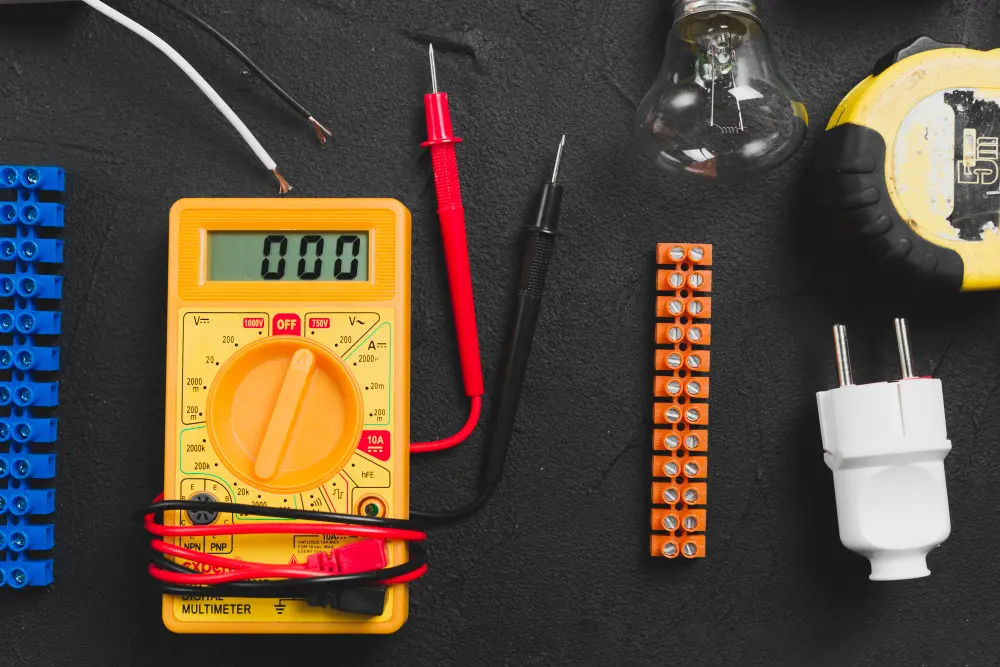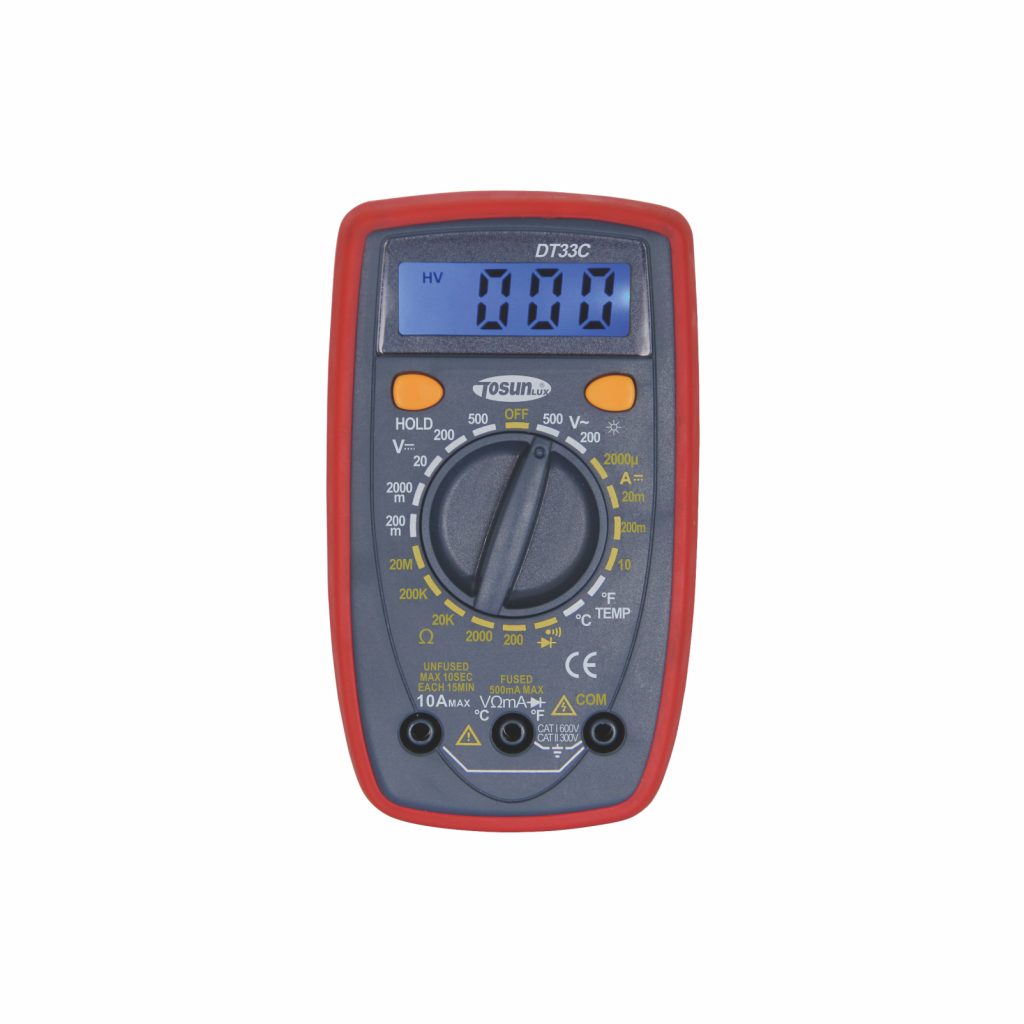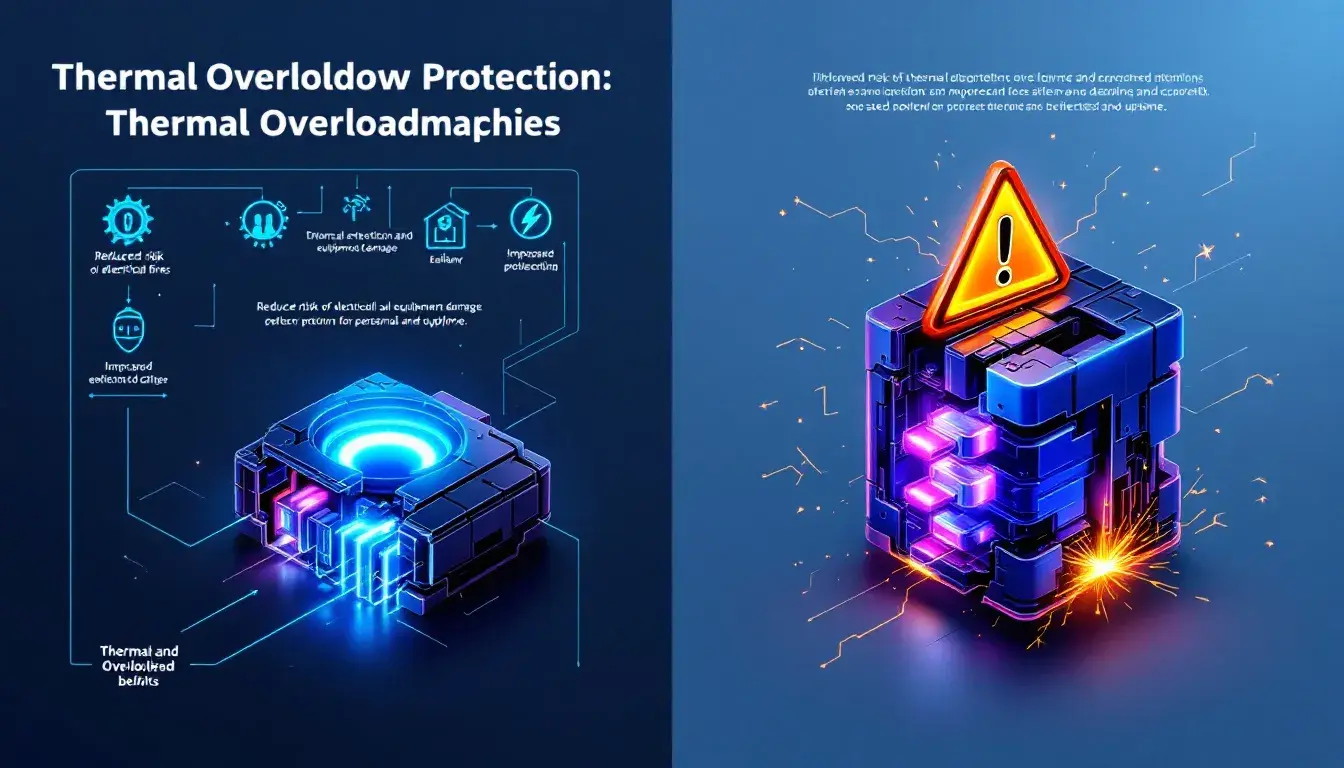Multimeter vs Voltmeter: What is the Difference
Table of Contents
ToggleMultimeters can measure voltage, current, resistance, and other parameters. Some voltmeters, particularly portable ones, are powered by the measured voltage source, which highlights their operational mechanisms within electrical work environments. Voltmeters specialize in voltage measurements only but provide greater accuracy. Choose multimeters for versatility or voltmeters when precision voltage readings are critical.
For those working with electrical systems, frequently there is a need to measure elements such as current, voltage, and resistance. Two prevalent instruments used for handling such requirements are the multimeter and the voltmeter. Within this guide, we aim to contrast these two analytical appliances and bring to light their key variances to facilitate selecting the most appropriate for your intended applications.
What is a Multimeter?
What is a Multimeter?
A multimeter is a handy tool used to measure different electrical quantities like voltage, current, and resistance. A handheld digital multimeter is particularly useful for electricians and HVAC specialists for taking measurements and troubleshooting in the field. It’s like having three tools in one! You can think of it as the Swiss Army knife of electrical testing.
Key Features of a Multimeter: Voltage, Current, and Resistance
- Versatility: Multimeters can measure voltage (up to 600 volts), current (up to 10 amps), and resistance (up to 20 megaohms). This makes them perfect for a variety of tasks, whether you’re working on a small home project or a larger industrial job.
- Display: Most multimeters have a digital display that shows the readings in numeric form, making it easy to understand the measurements.
- Probes: They come with two test leads that you connect to the circuit or component you’re testing. These test leads help you get accurate measurements by touching the points you want to test.
- Modes: You can switch between different modes to measure voltage, current, or resistance depending on what you need.
Why Use a Multimeter to Measure Voltage?
- Convenience: Instead of having separate tools for each measurement, a multimeter combines them all into one device.
- Accuracy: Modern digital multimeters provide precise measurements, often with an accuracy of ±0.5% for voltage and current readings. The high input resistance of modern digital multimeters ensures accurate measurements by minimizing the impact on the circuits being tested.
- Safety: It helps in safely testing electrical circuits to ensure they are working correctly and to prevent any electrical hazards.
Common Uses

Home Repairs: Check if batteries are still good or if electrical outlets are working.
Automotive Work: Diagnose electrical problems in cars.
Electronics Projects: Test and troubleshoot circuits in DIY electronics projects. A handheld digital multimeter is particularly useful for fieldwork, allowing for efficient and mobile troubleshooting of circuits.
In summary, a multimeter is an essential tool for anyone dealing with electrical systems, from professionals to DIY enthusiasts. It’s a reliable instrument that ensures you get accurate measurements for your projects.
What is Voltmeter
A voltmeter is an instrument used to measure the voltage, or electrical potential difference, between two points in an electrical circuit. An analog voltmeter uses a pointer on a calibrated scale to measure voltage, and it is particularly important for measuring AC voltage in specific applications. Here’s a simple breakdown to help you understand its essentials:
Purpose and Functionality
- Primary Use: Voltmeters are specifically designed to measure voltage. They can measure both AC voltage (Alternating Current) and DC (Direct Current) voltages.
- Accuracy: Voltmeters are known for their high accuracy in voltage measurements compared to multimeters. This precision is crucial for applications where exact voltage readings are necessary.
- Display: Most modern voltmeters have digital displays, which show readings in numeric form, making it easy to read and interpret the results.
Key Features
- High Input Impedance: This feature ensures that the voltmeter does not significantly affect the circuit being measured, allowing for accurate measurements. Different models of voltmeters have varying input resistances, which are crucial for ensuring reliable voltage measurements.
- Range: Voltmeters can measure a wide range of voltages, from millivolts (mV) to kilovolts (kV), depending on the model.
- Resolution: They offer high resolution, meaning they can detect small changes in voltage, which is essential for precise measurements.
Types of Voltmeters
- Analog Voltmeters: Use a needle and dial to display readings. They are less common today but still used for specific applications.
- Digital Voltmeters: A digital voltmeter provides readings on an LCD or LED screen, converting the unknown input voltage into a digital value for display. They are more popular due to their ease of use and higher accuracy.
Applications
Electrical Engineering: Used by engineers to test and troubleshoot circuits.
Household Use: Handy for checking batteries and household electrical outlets.
Industrial Use: Essential for maintaining and repairing industrial equipment. Fluctuations in the power supply voltage can impact the accuracy of digital voltmeters, making it essential to ensure stable power conditions during measurements.
In summary, voltmeters are essential tools for anyone needing precise voltage measurements. Whether you’re an electrical engineer or a DIY enthusiast, understanding how to use a voltmeter can help ensure safety and accuracy in your electrical work.
Comparison Table: Multimeter vs Voltmeter
| Feature | Multimeter | Voltmeter |
|---|---|---|
| Primary Function | Measures multiple electrical quantities: voltage, current, and resistance | Measures voltage only |
| Versatility | Highly versatile; acts as a multi-purpose tool | Specialized for voltage measurement |
| Accuracy | Offers accurate measurements but generally less precise than voltmeters for voltage | Provides high accuracy in voltage measurements |
| Input Impedance | Typically lower than voltmeters | High input impedance ensures minimal circuit interference |
| Display | Digital display showing readings in numeric form | Digital display for clear voltage readings |
| Resolution | Good resolution for general electrical measurements | High resolution for detecting small voltage changes |
| Applications | General troubleshooting, home repairs, automotive work | Precise voltage measurement in engineering and industrial applications |
| Types | Digital and analog multimeters available | Digital and analog voltmeters available |
| Cost | Generally more affordable for basic models | Can be more expensive due to precision capabilities |
| Use Cases | Suitable for DIY enthusiasts and professionals for varied tasks | Ideal for tasks where precise voltage readings are critical |
| Voltage Range | Wide range for general measurements | Specific range for precise voltage measurements |
In summary, the choice between a multimeter and a voltmeter depends on your specific needs. A multimeter is ideal for those who need a versatile tool for multiple measurements, while a voltmeter is best suited for applications requiring precise voltage readings.
Multimeters and voltmeters both play important roles in electrical measurement. Multimeters act as “jack of all trades” devices suitable for general circuit testing. Voltmeters focus exclusively on voltage measurements with superior accuracy. Select the option offering capabilities aligned with your intended applications. For broader use with flexibility, multimeters are preferable. But voltmeters excel when high-precision voltage readings are critical. Visit TOSUNLux website for recommended models to fit your budget and needs.
Frequently Asked Questions
How to convert multimeter to voltmeter?
To convert a multimeter into a voltmeter, select the voltage measurement option. Typically this involves turning a dial and verifying the displayed probes are for voltage. Readings will then indicate voltage potential instead of other electrical values.
Can you use a multimeter instead of a voltage tester?
Yes, in many cases a multimeter can substitute for a voltage tester. Most multimeters have a voltage measurement setting just like a dedicated voltage tester. The main advantage of a multimeter is its additional functionalities for measuring resistance, current and more. Safety is still required when performing voltage readings. Understanding voltmeter vs multimeter functions is important for this substitution.
Do I need a multimeter or voltage tester?
It depends on your needs. A multimeter is ideal for those who require a versatile tool for measuring various electrical quantities. A voltage tester, on the other hand, is useful for checking the presence of voltage without providing detailed readings.
What can a multimeter measure that a voltmeter cannot?
A multimeter can measure current and resistance in addition to voltage, whereas a voltmeter is limited to measuring voltage only.
What do you use a digital multimeter for?
A digital multimeter is used for measuring voltage, current, and resistance in electrical circuits. It is also used for troubleshooting electrical problems in various applications, including home repairs, automotive work, and electronics projects.
What is the advantage of using a digital multimeter?
Digital multimeters offer higher accuracy and precision in measurements compared to analog meters. They also provide easy-to-read digital displays and often include advanced features like auto-ranging and data hold.
What not to do with a digital multimeter?
Avoid using a digital multimeter on live circuits without proper safety precautions. Do not exceed the maximum input limits, and ensure the device is set to the correct measurement mode to prevent damage.
Can you touch a live wire with a voltage tester?
No, touching a live wire with a voltage tester or any other tool without proper insulation and safety measures is dangerous and should be avoided.
Tel: +86-577-88671000
E-mail: ceo@tosun.com
Skype: tosunelectric
Wechat: +86-139 6881 9286
WhatsApp: +86-139 0587 7291
Address: Room No.1001 Wenzhou Fortune Center,Station Road, Wenzhou, China
REQUEST A QUOTE
WhatsApp us
 : +86-139 0587 7291
: +86-139 0587 7291 English
English Español
Español Русский
Русский Français
Français العربية
العربية Português do Brasil
Português do Brasil Українська
Українська Türkçe
Türkçe Polski
Polski Nederlands
Nederlands Italiano
Italiano Bahasa Indonesia
Bahasa Indonesia हिन्दी
हिन्दी اردو
اردو አማርኛ
አማርኛ Հայերեն
Հայերեն ไทย
ไทย Монгол
Монгол فارسی
فارسی Shqip
Shqip Ελληνικά
Ελληνικά



